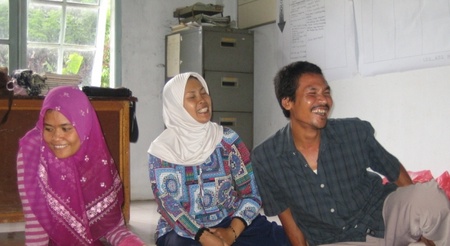A global health researcher from Aberdeen has spoken at an international conference this week on her work in pioneering new ways of involving some of the world's poorest communities in radical action to improve their health.
Dr Lucia D’Ambruoso, a lecturer in global health at the University of Aberdeen, will talk about Participatory Action Research (PAR), and how community participation in research – enabling people to take ownership of health challenges through the collective production and exchange of new knowledge - can bring positive changes in policy, awareness and practice.
Dr D’Ambruoso has co-authored a book, launched today, which explains the concept and how to put it into action. Participatory Action Research in Health Systems: A Methods Reader has been published by the Regional Network for Equity in Health in East and Southern Africa (EQUINET), Training and Research Support Centre (TARSC), the Alliance for Health Policy and Systems Research (AHPSR), World Health Organisation (WHO) and the International Development Research Centre (IDRC) Canada. The book is being launched at the Third Global Symposium on Health Systems Research in Cape Town, South Africa - a major international event bringing together researchers, policy-makers, representatives of donor and multinational organisations and other stakeholders to share evidence, identify knowledge gaps and develop research agendas.
In Cape Town, Dr D’Ambruoso will talk about this approach, with examples in maternity care in South Asia and health surveillance in South Africa. The event aims to deepen the discussion for researchers, health workers, academics, people working in state, civil society and non-state organisations, community leaders, and workers in all regions who are using – or are keen to use – participatory methods to improve health awareness, systems and care.
Explaining the concept of Participatory Action Research, Dr D’Ambruoso says: “PAR seeks to understand and improve the world by changing it. It transforms the role of people who usually ‘participate’ as the subjects of research. Instead of being passive recipients, those directly affected by problems become active researchers and agents of change who collectively act, produce change and create and new knowledge.
“In today’s world there is a growing demand to channel collective energy towards justice and equity in health, and to better understand the social processes that influence health and health systems in all countries. Communities, frontline health workers and other grass-roots actors play a key role in responding to this demand, in raising critical questions, building new knowledge, and provoking and carrying out action to transform health systems and improve health. We have many methods, tools and capacities – old and new – to increase social participation and power in generating new knowledge through participatory research. I’m looking forward to sharing my own work, hearing from others, and discussing how together we can use this approach to benefit those in greatest in need.”
Dr D’Ambruoso will also be discussing opportunities for organisations to take advantage of postgraduate student attachments. Students on the University’s MSc in Global Health and Management have the opportunity to undertake work-based placements of ‘real world’ benefit for the sector and for students in their studies on the journey to careers in global health.


